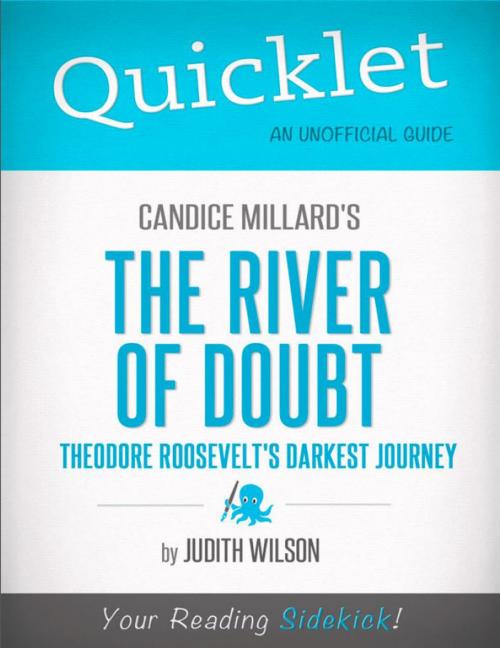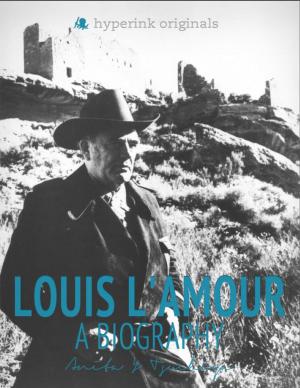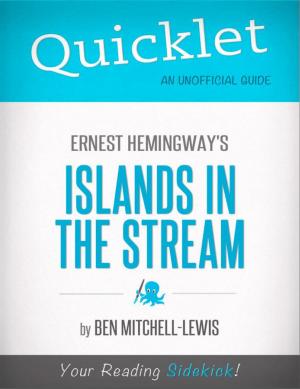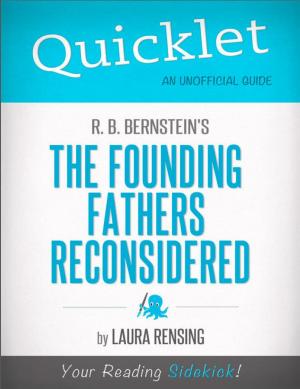Quicklet on Candice Millard's The River of Doubt: Theodore Roosevelt's Darkest Journey
Nonfiction, Reference & Language, Study Aids, Book Notes, Art & Architecture, General Art| Author: | Judith Mary Wilson | ISBN: | 9781614648536 |
| Publisher: | Hyperink | Publication: | March 2, 2012 |
| Imprint: | Hyperink | Language: | English |
| Author: | Judith Mary Wilson |
| ISBN: | 9781614648536 |
| Publisher: | Hyperink |
| Publication: | March 2, 2012 |
| Imprint: | Hyperink |
| Language: | English |
ABOUT THE BOOK
The story of one of President Theodore Roosevelt’s most dangerous adventures, Candice Millard’s The River of Doubt: Theodore Roosevelt’s Darkest Journey, goes beyond telling the tale of Roosevelt’s harrowing passage along an uncharted South American river to explore his character and the motivation that drove him to seek such a challenge. Family, dogged determination, his personal philosophy, and political loss are all elements that contribute to this portrait of a complex man and make him more than a one-dimensional historical figure.
Millard conducted extensive research to understand both the members of the expedition and the area through which they traveled, providing depth and detail to a real-life voyage gone wrong. In the “Notes” at the end of the book, the sources she cites fill 38 pages and include scores of news reports of the day, transcripts of lectures, and letters. The “Select Bibliography” occupies another eight pages and lists books and papers on the people of the rain forest, as well as its plants and animals, expedition members’ personal accounts of the journey, and Roosevelt’s own writing. The knowledge she acquired allows her to capture a sense of both the people and the place and the risk the explorers were taking as they headed into the unknown.
EXCERPT FROM THE BOOK
More menacing was the constant presence of the Cinta Larga, a tribe of cannibals who blended into the landscape and never showed themselves, but kept watch on the foreigners who had encroached on their territory.
Enduring near starvation as their food ran low, many members of the expedition became ill, most notably, Roosevelt himself, who was suffering from malaria and developed an infection after injuring his leg on a rock in the river. Near death, he decided to take his own life with a lethal dose of morphine, believing that it was better to sacrifice one life than risk the safety of the whole team. Kermit, however, took charge, and the expedition moved on, carrying Roosevelt on one of the dugout canoes.
The expedition became an unrelenting ordeal and struggle for survival as fear, hunger, exhaustion, and disease sapped the men’s strength and spirit. Finally, they spotted evidence of rubber tappers on the river bank, signaling that they had reached a known part of the river. Settlers there gave them food and a dry place to sleep, and the worst was over...
Buy a copy to keep reading!
ABOUT THE BOOK
The story of one of President Theodore Roosevelt’s most dangerous adventures, Candice Millard’s The River of Doubt: Theodore Roosevelt’s Darkest Journey, goes beyond telling the tale of Roosevelt’s harrowing passage along an uncharted South American river to explore his character and the motivation that drove him to seek such a challenge. Family, dogged determination, his personal philosophy, and political loss are all elements that contribute to this portrait of a complex man and make him more than a one-dimensional historical figure.
Millard conducted extensive research to understand both the members of the expedition and the area through which they traveled, providing depth and detail to a real-life voyage gone wrong. In the “Notes” at the end of the book, the sources she cites fill 38 pages and include scores of news reports of the day, transcripts of lectures, and letters. The “Select Bibliography” occupies another eight pages and lists books and papers on the people of the rain forest, as well as its plants and animals, expedition members’ personal accounts of the journey, and Roosevelt’s own writing. The knowledge she acquired allows her to capture a sense of both the people and the place and the risk the explorers were taking as they headed into the unknown.
EXCERPT FROM THE BOOK
More menacing was the constant presence of the Cinta Larga, a tribe of cannibals who blended into the landscape and never showed themselves, but kept watch on the foreigners who had encroached on their territory.
Enduring near starvation as their food ran low, many members of the expedition became ill, most notably, Roosevelt himself, who was suffering from malaria and developed an infection after injuring his leg on a rock in the river. Near death, he decided to take his own life with a lethal dose of morphine, believing that it was better to sacrifice one life than risk the safety of the whole team. Kermit, however, took charge, and the expedition moved on, carrying Roosevelt on one of the dugout canoes.
The expedition became an unrelenting ordeal and struggle for survival as fear, hunger, exhaustion, and disease sapped the men’s strength and spirit. Finally, they spotted evidence of rubber tappers on the river bank, signaling that they had reached a known part of the river. Settlers there gave them food and a dry place to sleep, and the worst was over...
Buy a copy to keep reading!















